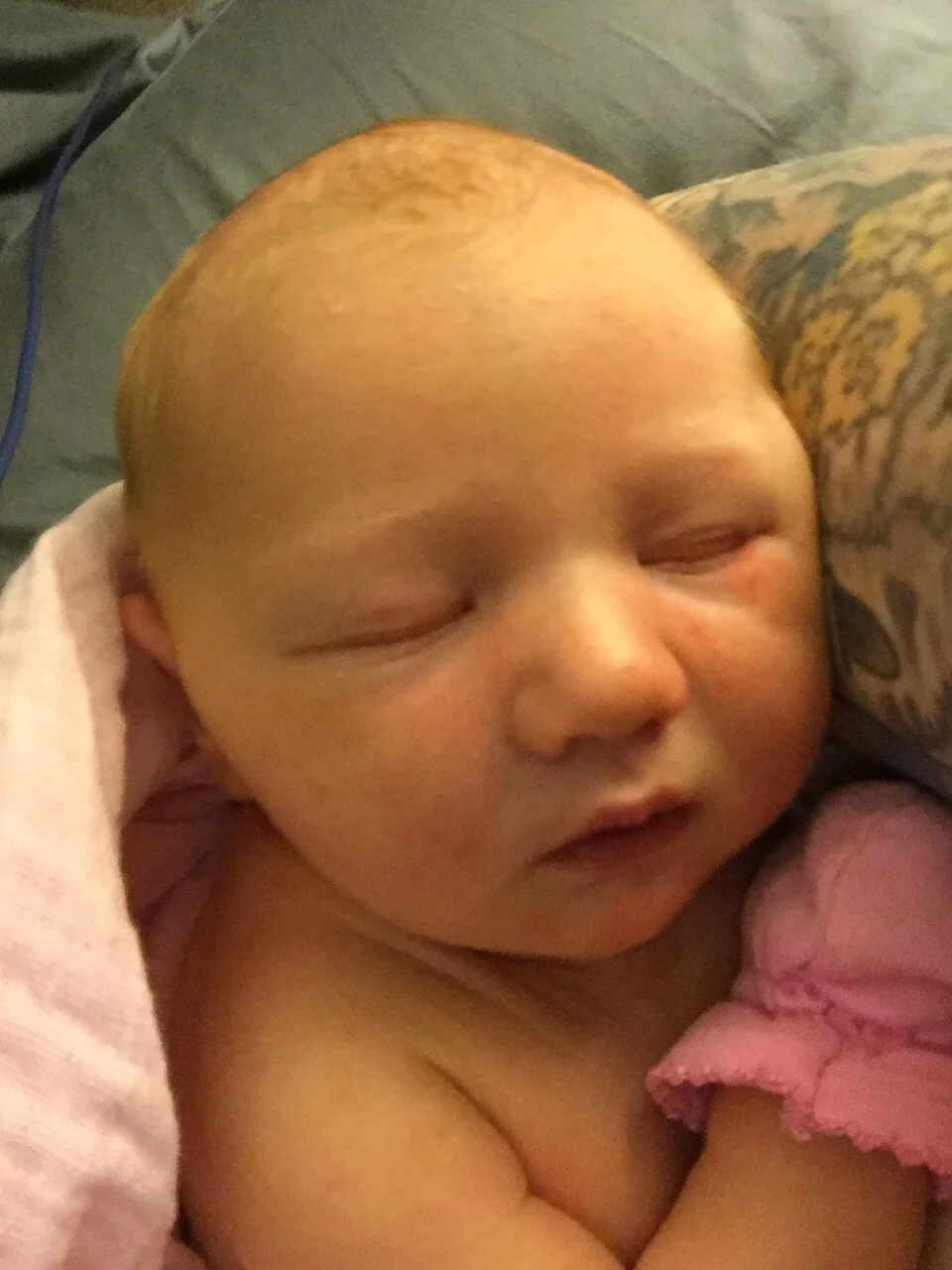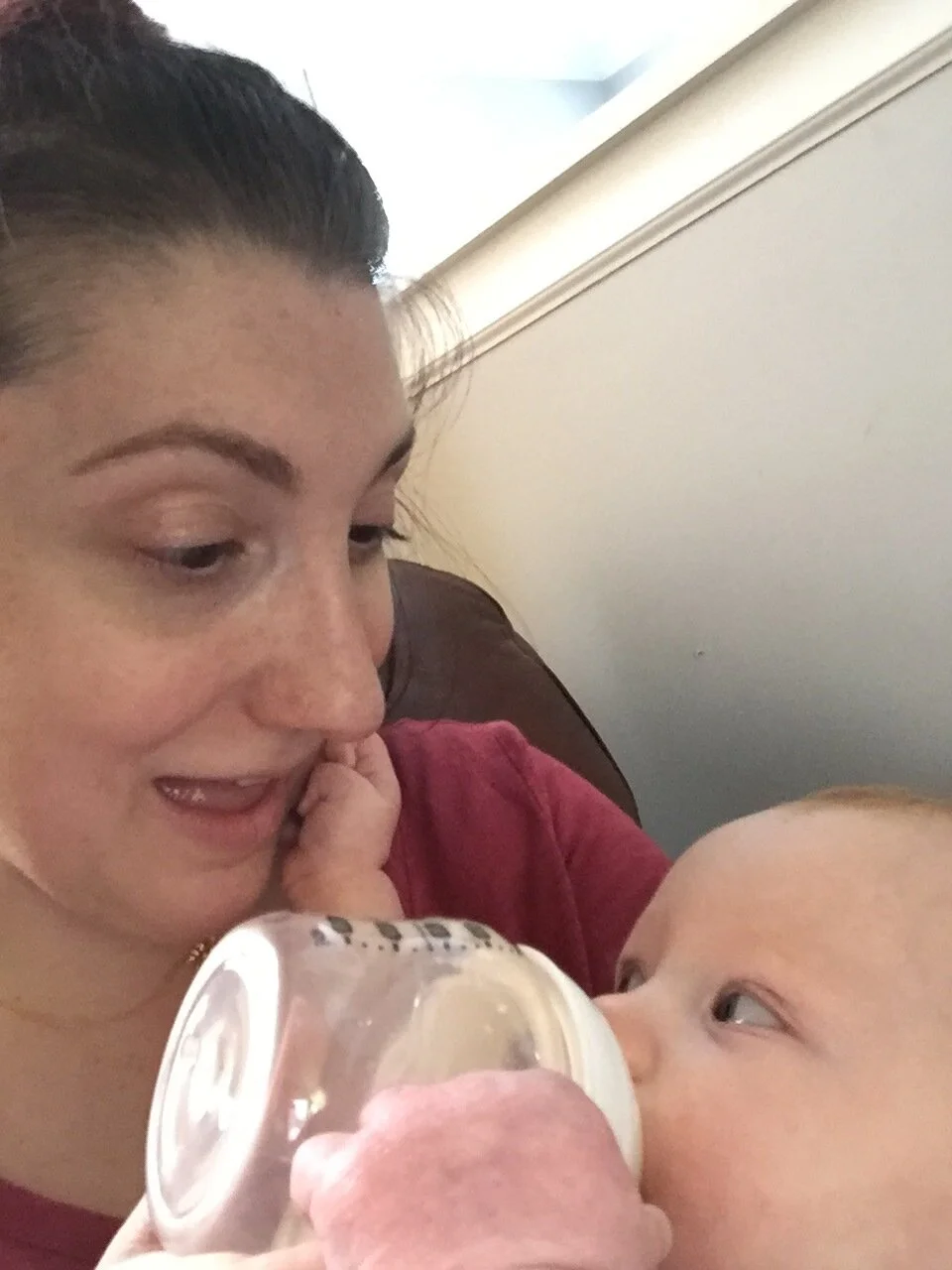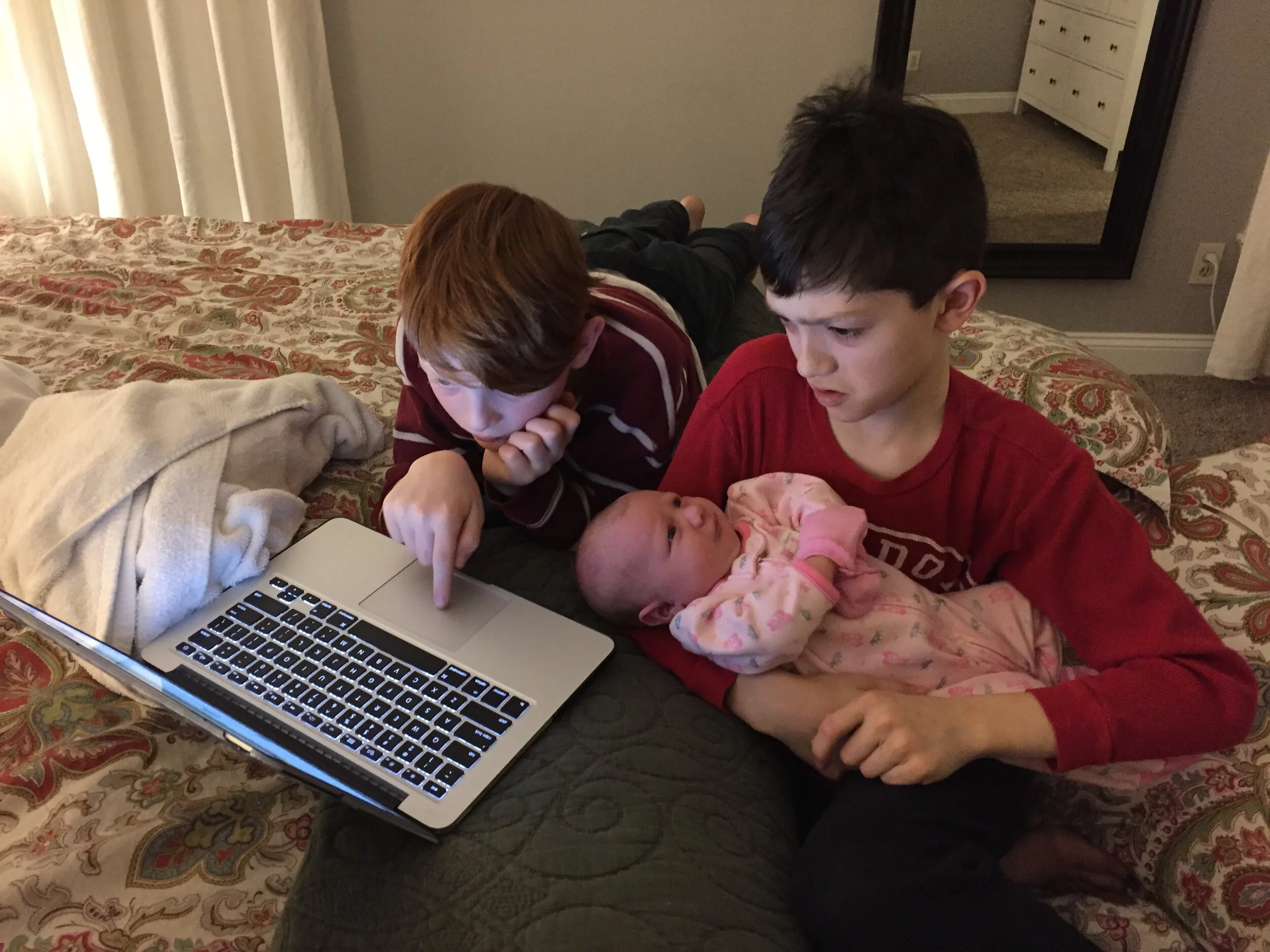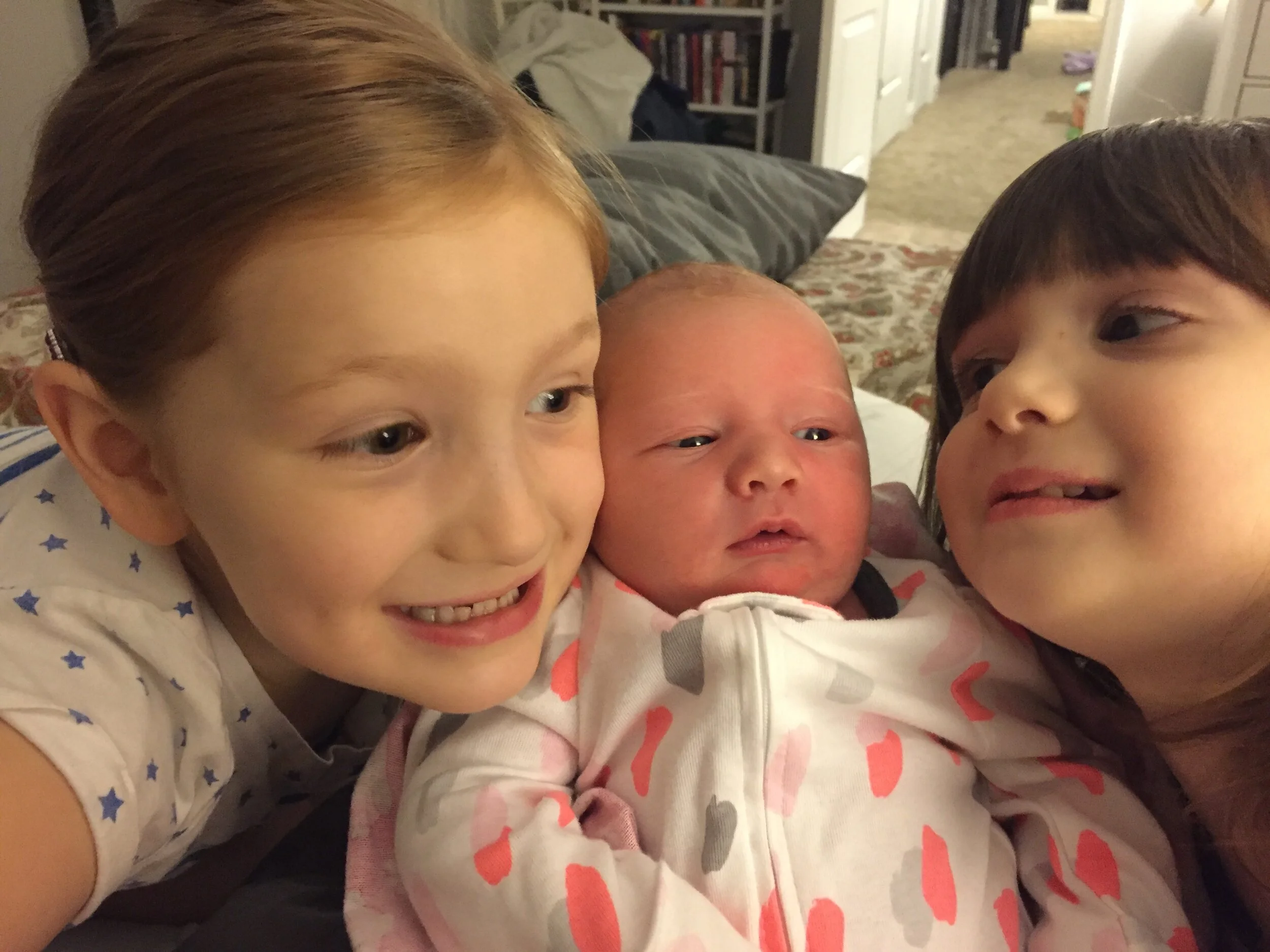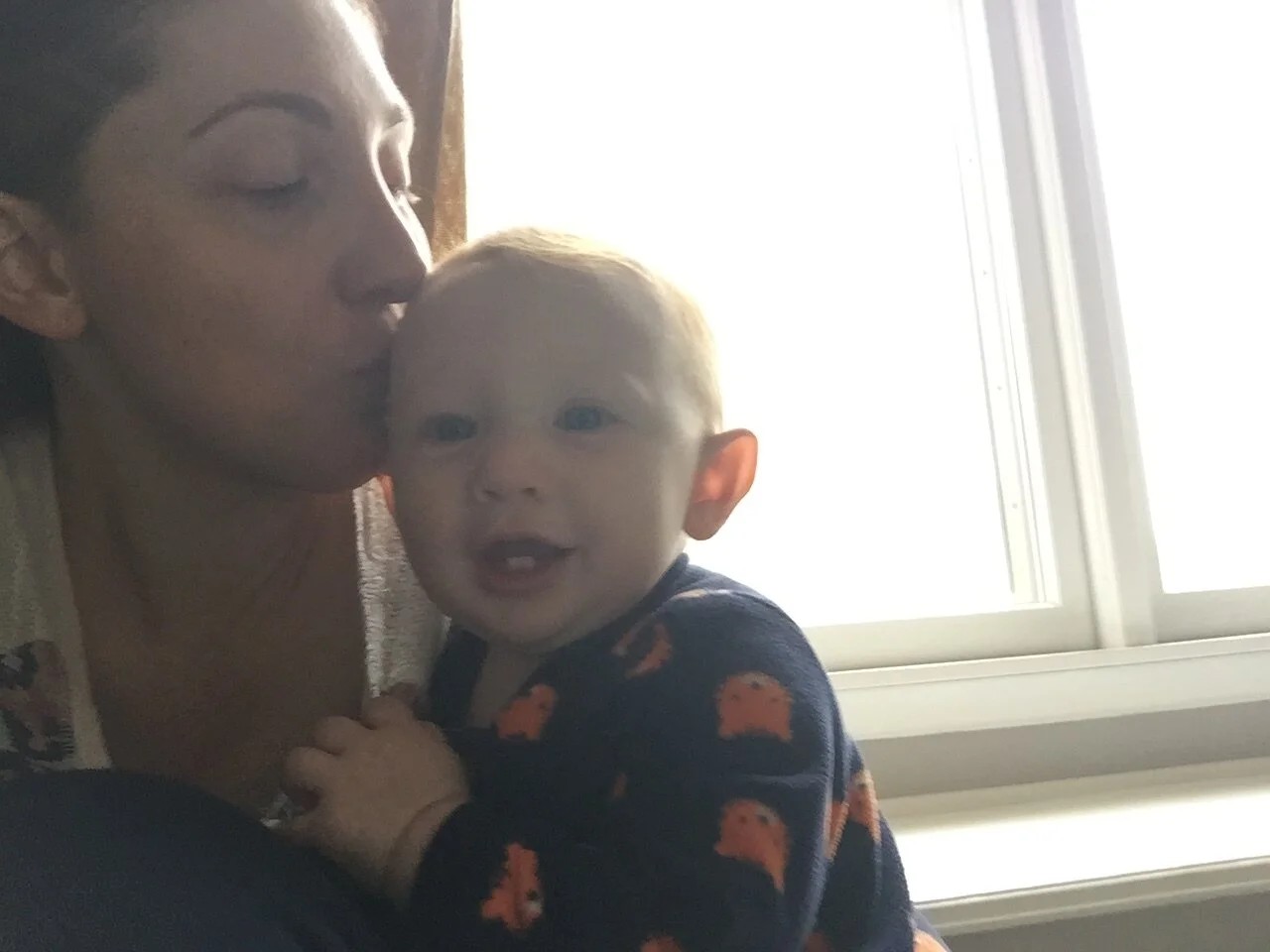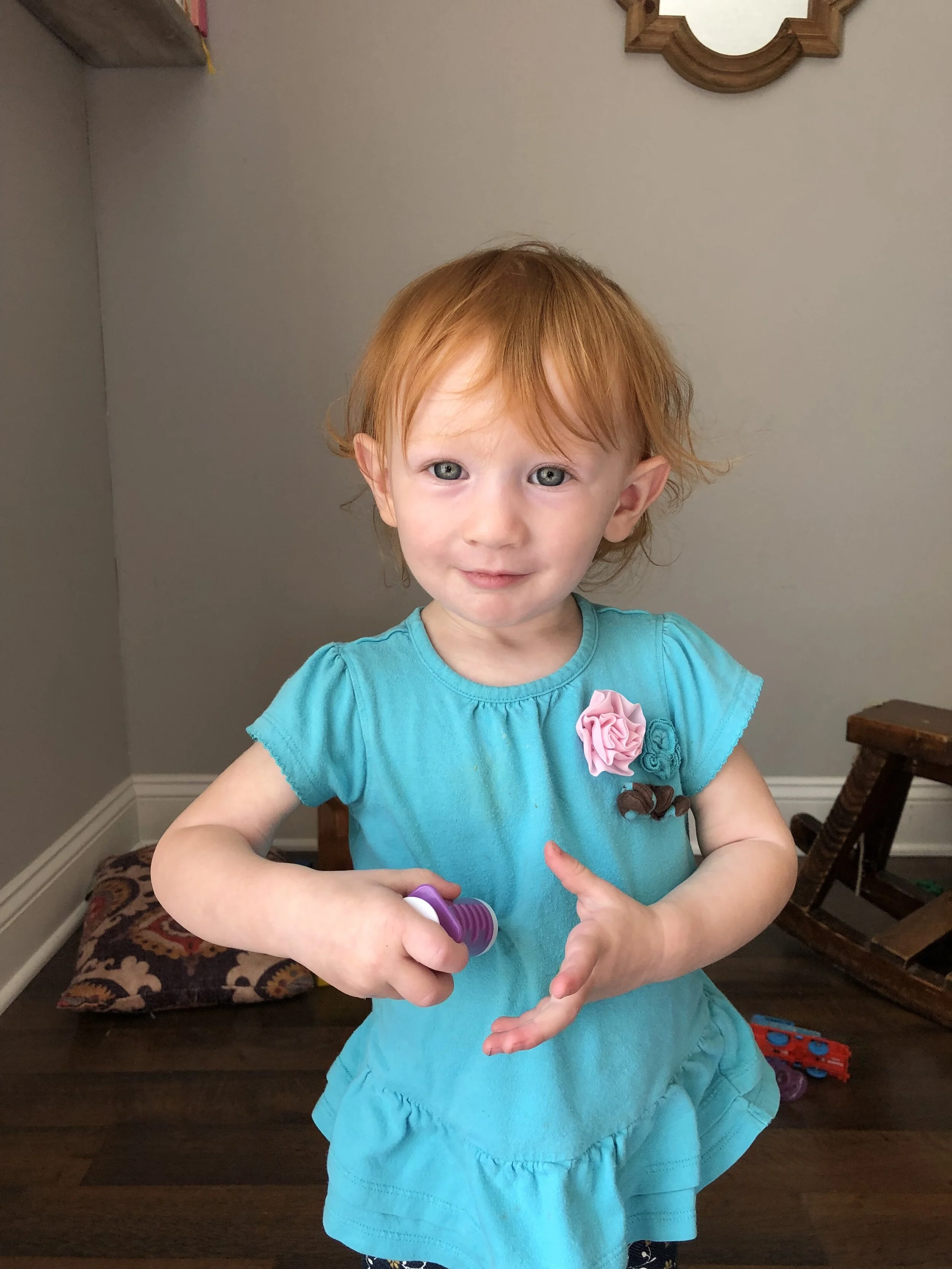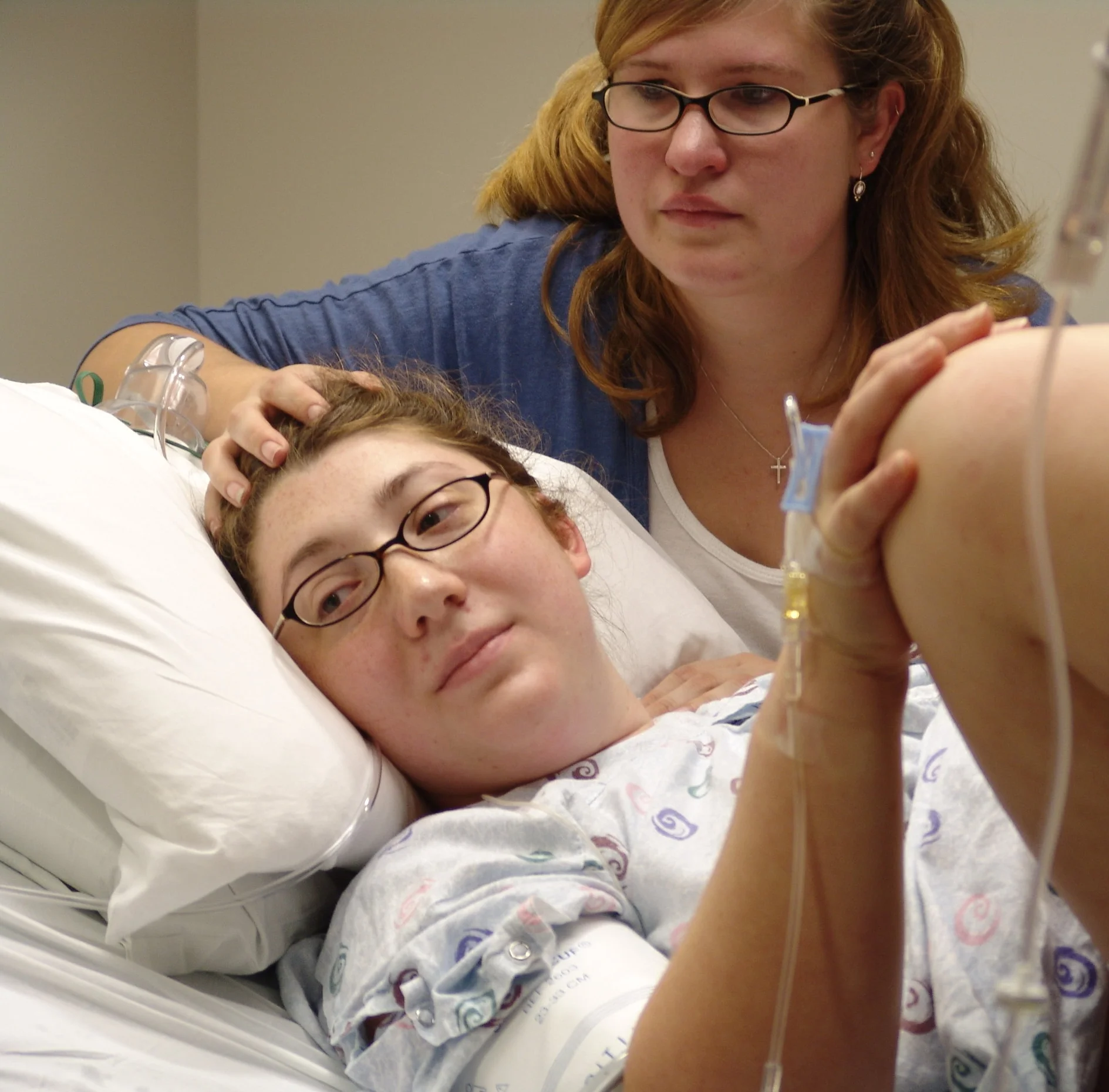Part 7: The Art of Welcoming Life When You Hate Bringing it Forth - Reflections on Pregnancy and Womanhood
November 24, 2019
Note to the Reader: The following post contains frank and honest discussion concerning reproduction, femininity, sexuality, and some of my own personal journey with these things.
Recently I realized that this series, these emotionally charged contemplations birthed from pregnancy hormones were not, in fact, finished. It’s been two years since I set out on my reflective journey.
Are you interested in how it ends? So am I.
I write this chapter for my sisters, for all those who walk beside me, behind me, and before me. I write this for the gloriously beautiful women who have been with me on my own journey, helping me to wrestle and surrender my way to this final birth...and all that came after.
On January 3, 2018, John and I were laying under a pile of blankets, watching the finale of The Great British Bake Off. (He was under a pile of blankets. I was the size of a barn, generating enough heat to warm a small cottage, so I was blanketless.) I wanted cake. And bread. And I was irritated that I had neither. I was also irritated that I hadn’t had more than a single contraction at a time for days. More than angry, I was flummoxed. I’ve had four labors, if you recall, and all of my births were preceded by a solid week of heavy contracting. The kind of contracting that tells you that It Is Time.
I was 40 weeks, 3 days pregnant. I was 90 pounds over my healthy weight. I was literally sick of eating. My joints protested of their abuse with each step that I took and were threatening a revolution. I peed so often I had researched if David Sedaris’ famed Stadium Pal was a real thing…and if they made it for women. (They do.)
“Aw, look at you go!” my best friend would say, encouragingly, when I tried to climb the stairs.
I was so done you could have stuck a fork in me. “I don’t feel like I’m ever going to go into labor,” I told John. And he, wise father of four, refrained from speech. I wailed on. “My body is doing nothing!”
I woke up at 5am the next morning, full-on laboring.
See? The Lord said. The process doesn’t always look the same. And. I bring it to completion. I always do.
I lay there for a moment, holding space for the depth of my emotion. Then I got up. Because I had to pee. As I did so I recalled the despondency that had filled me when I had discovered that I was pregnant via the same activity. I laughed.
It had been some of the hardest, most painful ten months of my life. Even so, THIS contributor to my hardship was about to be over. One way or the other, the baby was coming OUT.
AND THEN. IT WOULD BE FINISHED.
The Popovers of John. Thank you, Great British Bake Off, for this gift in our lives.
Preparations were made. People arrived. The birthing tub was filled. John made Popovers. I labored. I received the kind care of the women surrounding me. I opened to their comfort. I didn’t think about what I was doing. I didn’t even notice what was happening until someone pointed it out.
I was laboring graciously, peacefully. With resilience.
(I know. Go ahead, let your mouths drop open.)
When the contractions came I surrendered to their work. I let them come through and down. I imagined them opening my cervix. I imagined that baby descending. And then, when they were done, I let them go. I released them.
I RELEASED THEM.
That was something I had never before been able to do. And then I could laugh and snack and chat and wait, welcomingly, for the next one to come. It took me 10 years and five deliveries to get there, but I was finally doing it. I was laboring and…I was able to be myself.
How could I possibly post a blog without mentioning Katie Ryan?
I was laboring and I did not turn inwards and rage. I was not lost in dark lonely places. I did not attempt to wrestle for control of my contractions. I accepted the process. I surrendered to the journey. I listened to my body.
I wasn’t alone in my work. On the outside, I could receive the upholding that was given by the hands of those touching me. On the inside, I was aware of the presence of the Lord. (It surprised me.) It was like walking into your home to find your favorite friend unexpectedly waiting for you. I had never before been able to meet Him, so sweetly, in that place of struggle.
I spent my whole day in that space, a space I had longed to enter in to but had never before known. It was hard work. I was in pain. But I wasn’t suffering. There is a profound difference between those two things.
And then, you know, a tiny piece of cervix wouldn’t get out of the damn way and I was complete at 10cm for two hours with monster contractions ripping through me and then there was swearing and hysteria and I was all kinds of suffering and right when I was about to reach on up and savagely pull that baby OUT OF MY BODY, (which, ok, yes, I never would have been able to do…because I was so enormous it would have been a physical impossibility and, yes, biology,) she came.
She really did.
And it hurt a lot, because you know, it does. And I kind of lost my mind there for the ten minutes it took me to push her out. But I did.
I gave birth to Tabitha Vivienne Maeve on January 4th, sometime around dinner. My midwife drew her out of the water and held her up and I said, “It’s a Tansy!” The women gathered in that sacred space laughed, touching her red hair and plump little body.
I wept. I was overwhelmed at the glory of birthing the way I had always wanted to birth. I marveled at the extraordinary experience of bringing another life into the world. I felt deep love for her.
And, something felt wrong. I felt, strange. Far away.
Holding my baby, amidst the love and delight I felt anxious. Uncomfortable. Off. Sad. Depressed. So tired. The next few days were hard.
I usually have a week of bearable nursing before the whole thing goes to hell. Well. Tibby had me yelping the first time she latched on. Then I got sick with a virus and didn’t know it until I was left at home with five children and a 103 degree fever, just a few days postpartum. I called my best friend, hysterically crying.
I couldn’t stop crying.
The kind of crying in which you cry because it feels like the whole world is going to crack and break and you are desperately holding the pieces together, not daring to breathe lest your breath cause you to lose your tenuous hold.
I felt like my baby didn’t need me. I felt like anyone could have been her mama. I felt like I was far away. I felt like I was under water, watching myself from below a million pounds of pressure.
Three days in, the pain from nursing Tabitha was straight up excruciating. When John would take her, to let me sleep, I couldn’t fall asleep. I would lie in bed physically shaking from the anxiety of knowing I would have to feed her again. And feeling guilty for feeling such dread. For not wanting to hold her, because holding her meant feeding her. And feeding her was horrible.
I got a lactation consultant to the house as soon as I could. She gently told me that I needed to stop nursing until we understood what was happening in Tibby’s mouth. I cried and cried. Because this was my last baby and I wanted to nurse her.
Obstinacy and dreams; sometimes we can’t let go of things that are hurting us, because of the power of those two.
I started exclusively pumping. And then cried and cried some more, because it was the most incredible relief to not be in pain, to not dread feeding my little girl. To not dread holding her.
I was able to enjoy my baby.
So then I wept and wept because I hadn’t been enjoying my baby. And I wept because, for the last 10 years, I had believed that my struggles with nursing were mostly my fault. (I was told it was my body, my skin, my inexperience.)
It’s not me. It’s my dang children.
My three red-headed babies have all had lip and tongue-ties. That is the primary reason that nursing them was painful and fraught with difficulty.
I’m grateful for this knowledge that has illuminated my past. And I’m mad and sad that no one was ever able to tell me what I needed to know when I needed to know it. That I made decisions, based on misinformation, that hurt me.
Tibby had three lip-ties and a posterior tongue-tie.
We had her ties lasered. Which was awful for all of us. We did the oral exercises. We did everything they told us to. She still couldn’t figure out how to nurse. I kept crying.
I kept pumping. And gave her formula, because I was making so little milk. She struggled with bottle feeding. And she explosively vomited and had horrible eczema. So I stopped giving her formula. (She vomited less.) I went off soy, dairy, grains, and eggs. (She stopped vomiting.) Her skin cleared up. And I realized, with feeling of doom, that pumping was not going to be optional.
I was in it for the long haul.
I took Tibby to see an ankyloglossia body worker. She gave us the Big Insight by correctly diagnosing our baby with a disorganized suck. (Tibby could not sequentialize the motor movements needed to suckle.) Instead of sucking she was chomping…with an amazing amount of force! Which was why she couldn’t nurse. Which was why she gagged so much on the bottle, any bottle. (DO YOU KNOW HOW MANY DIFFERENT KINDS OF BOTTLES THERE ARE?)
I kept looking for solutions. And, every time I left my bedroom I felt like I was seconds away from having an anxiety attack. Those four walls contained all that I felt able to handle. There were some days that I would go downstairs because people were there, and food, and I wanted to be with both of those things. But as soon as I went down my heart would start racing.
The greater the distance from my room, the more anxious I felt.
I needed to be there. The need was driving, compelling. It went round and round in my head, a spinning record that was always playing. When Tabitha wasn’t with me, I felt the same way. While simultaneously feeling like she didn’t need me.
On the 20th of January, my birthday, I lay in bed with the shades pulled down.
John came up and lay beside me and I talked and cried and talked and cried some more. I told him that it felt like I was reaching for Tabitha and she was reaching for me but we couldn’t find one another. It was painful to my heart, to feel like we were in separate dimensions, a thin veil between us.
It felt like that for a long time.
My midwives, doula, friends, husband, therapist, all sat with me while I wept over what was and what was not.
I wasn’t alone in the sadness.
And, I was still sad.
Pumping was time consuming. And the anxiety of not making enough milk ruled my every hour. (Underproduction sucks.) As soon as I was done pumping I would start stressing about making enough milk in time for the next bottle. And, you know, this whole reality was taking place in the context of doing life. So much life.
It was a lot.
We tried alternative formulas. She wouldn’t drink any of them. I saw an IBCLC, who was a comfort, but no gift of skill could help Tibby to nurse. She suggested donor milk, but the prospect of finding someone with all of my dietary restrictions felt impossible. It felt too hard to even try to find a solution. (The Catch 22 of anxiety and depression.)
Acknowledging that I was a mess was humbling. If you have trouble leaving your bedroom, managing a household of seven people is going to feel impossible. And if you say, “I’m really overwhelmed and anxious,” but don’t seem that way, people may think you are exaggerating. People may not understand. They will probably make judgements.
I found that mostly, I didn’t care.
And I found that, to my embarrassment, sometimes I did. And, I kept asking for help. Though I was mourning the loss of what I wanted, I was also thankful that bottle feeding gave me the freedom to sleep. And go to counseling. Or go out for an afternoon, even if I spent the whole time wishing I was back in my bedroom.
Everyone in our family fought over feeding Tibby, from John all the way down to the four-year-old. Hell, if the dog could have fed her, she would have. (They also fought over who got to hold the baby, and pick out her clothes, and sit by her. ALL THE TIME.)
Just hanging with the brothers. Big kid style.
There is something so precious about how our family has oriented around Tabitha, because of my postpartum experience, because she couldn’t nurse, because she was a wholly unexpected little person.
The Three T’s.
By the time she was five-months-old I knew that if I didn’t change something, the stress from underproducing was probably going to give me a stroke. Five years ago, I think I would have just had a stroke. But not now.
Now I understood that that FEELING of impossibility was simply that, a feeling. Although that Feeling had paralyzed me for months, I didn’t accept it as my End All Be All Truth. Though this simple act felt like climbing a mountain while carrying an elephant, I took it: I found a milk-donor group and posted what was probably a hysterical cry for help. Within days a donor contacted me.
She faithfully and graciously donated milk to us for close to a year.
With all sincerity, that gift was probably the most precious thing that anyone has ever given me. The anxiety of LITERALLY not having enough to feed my little baby had been all consuming. To have help, to have relief from that stress changed the paradigm of my life. I was beyond grateful, like, bow down and genuflect and kiss her feet grateful that this woman so generously shared her milk with us.
It was a long, long, long road back to balance.
The Squidge.
Along the way, the most difficult and precious thing I have practiced is being honest about my experience while holding Joy and Grief in the same space. (It’s a hard one.)
The story didn’t go how I wanted it to. And, I am so glad that Tibby has such sweet bonds with John and the kids. And, I am still mourning that she didn’t attach to me the way that my breastfed babies did.
She is an extraordinary, unexpected gift in our life. She is wholly her own little person.
The Gelfling Girl.
I’m going to say it again. This whole thing did not go the way that I wanted. And mourning that has taken time and space.
And, I’m ok. I’m able to be myself.
And that is because of many things and many people. And. A lot because of women. Sisters, one of the most powerful things that we will experience in life is when we are surrounded by the opening, embracing, nurturing comfort of the community of women. And when we can receive it.
Sisters. Postpartum depression and anxiety are monstrous things to be alone with.
Do not be alone. It is not your fault. It is far, far, far more common than you could ever dream and if no one told you that this might happen, I am so sorry.
And….there is hope. There are hands waiting to reach out and lift you up.
The conclusion to this series will be posted next week.





